Tajik Air
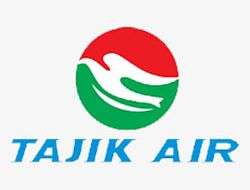 | |||||||
| |||||||
| Founded |
| ||||||
|---|---|---|---|---|---|---|---|
| Hubs | |||||||
| Fleet size | 14 | ||||||
| Destinations | 19 | ||||||
| Company slogan | National airline of Tajikistan | ||||||
| Parent company | Government of Tajikistan | ||||||
| Headquarters |
Dushanbe International Airport Dushanbe, Tajikistan | ||||||
| Website | tajikairlines.com/ | ||||||
State Unitary Aviation Enterprise "Tajik Air" (Tajikistan Airlines) is the national airline of Tajikistan. It has its head office at Dushanbe International Airport in Dushanbe.[1] The airline has its main hub at Dushanbe International Airport, and it retains a secondary focus point at Khujand's Khudzhand Airport.
History
The first flight of the airline was from Bukhara to Dushanbe on 3 September 1924 by a Junkers F.13 aircraft, initiating development of civil aviation in Tajikistan. The first aircraft appeared in the capital two years earlier than the car and five years earlier than the train.
For the first time, the Stalinabad airfield complex was formed and operation of new routes started over the Pamir mountain ranges. In 1930, a first class airport was built in Dushanbe. One year later airports were built in Kulyab, Garm, Panj and Dangara where regular flights were operated from Dushanbe. Aviation of Tajikistan developed rapidly as the air fleet expanded. Air transport became an essential branch of the country's national economy. Tajik aviation provided regular transport connection between the capital of the Republic and all the highland settlements in the hard-to-reach valleys of Vanch, Rushan, Shugnan, Bartang, Yagnob and others, reducing the travel time of passengers of the mountain regions of the Pamirs, Karategin, blooming valleys of Vakhsh, Hissar by tens or hundreds of times. In March 1937, the Tajik Territorial Department of Civil Air Fleet was formed.
In 1945, the Tajik Department of Civil Air Fleet (TU GVF) received new Lisunov Li-2 and Junkers Ju-52 aircraft. The first flight by the crew of the Li-2 aircraft was operated on the route Stalinabad - Moscow. In the 1950s and 1960s aviation in Tajikistan was one of the most developed sectors of the national economy of the Republic. From 1951, Antonov An-2s were utilized in the fleet of the Tajik Department of Civil Air Fleet and in 1954 Ilyushin Il-12s were introduced by which the first flight on the route Stalinabad - Sochi was operated. Between 1956 and 1964, Ilyushin Il-14, Ilyushin Il-18 and Antonov An-6 (high-altitude version of the An-2) aircraft joined the fleet, as well as Mil Mi-4 helicopters.
Aviators of Tajikistan were always in the front line of development of the socio-economic potential of the country. For the first time in 1959, B.M. Vorobiev landed an aircraft (an An-6) on the ice of the Sarez Lake. In 1960, the first flight on the route Stalinabad - Moscow was operated by an Ilyushin Il-18. The TU GVF's structure was expanded and developed.
In 1959, the Leninabad aviation enterprise was founded and, in a year, the Kulyab airport was established. On March 3, 1960, the passenger terminal and runway were put into operation. The airway Stalinabad - Frunze - Alma-Ata, Novosibirsk was opened. In the 1970s and '80s pilots and navigators of the Tajikistan Civil Aviation Authority mastered such aircraft as the Tupolev Tu-154, Yakovlev Yak-40, Antonov An-26 and Antonov An-28. In 1979 the first flight to Afghanistan was operated by an Il-18 aircraft on a humanitarian mission. In 1984 the automatic reservation system "Sirena" for booking seats on the domestic airlines was introduced. In 4 years the Tajik Civil Aviation Authority changed over to the new conditions of management and planning.
Judging by efficiency of the Yak-40 and Aa-28 aircraft utilization, the Tajik Civil Aviation Authority won first place in the USSR's Air Fleet. In the 1990 -1991 period the aircraft-helicopter fleet of the aviation enterprise was expanded with Ilyushin Il-76 and Tupolev Tu-154M aircraft; and Mil Mi-8 helicopters. The first in Central Asia transponder "Zardak" was built and air service on the route Dushanbe-Ürümqi was opened.[2] It is the sixth oldest airline still in operation.
In 2008, Ashutosh Beenessreesingh was named CEO of the company. He has since realized significant cost reductions that have helped bottom line increase twofold.
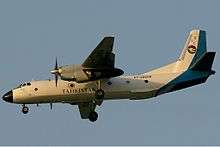
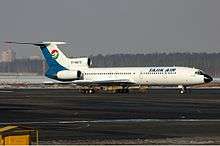
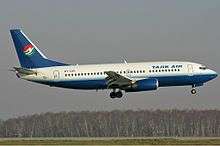
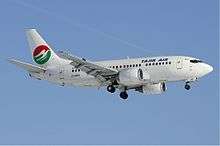
Destinations
Tajik Air serve the following (as of October 2016):[3]
Asia
Central Asia
- Dushanbe - Dushanbe Airport Hub
- Khujand - Khujand Airport
- Qurghonteppa - Qurghonteppa International Airport
East Asia
South Asia
Western Asia
Europe
- Moscow - Moscow Domodedovo Airport[3]
- Novosibirsk - Tolmachevo International Airport[3]
- Saint Petersburg - Pulkovo International Airport
- Surgut - Surgut International Airport
- Yekaterinburg - Koltsovo International Airport
Codeshare agreements
Tajik Air has codeshare agreements with the following airlines ( as of January 2013):
Fleet
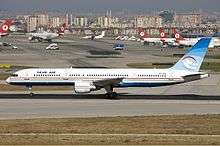
As of January 2013 the Fleet of Tajik Air consists of the following aircraft:
| Aircraft | Active | Orders | Notes |
|---|---|---|---|
| Antonov An-26 | 1 | 0 | |
| Antonov An-28 | 2 | 0 | Used on flights to Khorogh only |
| Boeing 737-300 | 1[5] | 0 | |
| Boeing 737-400 | 1[5] | 0 | |
| Boeing 757-200 | 2[5] | 0 | |
| Yakovlev Yak-40 | 1 | 0 | |
| Sukhoi Superjet 100 | 0 | 2 | 2 under option |
| Tupolev Tu-154M | 2 | 0 | |
| Xian MA60 | 1[5] | 0 | |
| Mil Mi-8 | 3 | 0 | Helicopters, not in scheduled passenger service |
| Total | 14 | 2 |
The airline fleet previously included the following aircraft:[6]
- 2 Boeing 737-500
- 1 further Xian MA60
References
- ↑ "Directory: World Airlines." Flight International. 30 March-5 April 2004. 78. "Titov Street 31/2, Dushanbe International Airport, Dushanbe, 734006, Tajikistan."
- ↑ "TajikAir.TJ - Таджикские Авиалинии - ТАРИФЫ". web.archive.org. 2012-02-18. Archived from the original on February 18, 2012. Retrieved 2016-05-21.
- 1 2 3 4 "Flights schedule". web.archive.org. 2014-01-16. Archived from the original on January 16, 2014. Retrieved 2016-05-21.
- ↑ "Первый самолет по маршруту Душанбе-Пекин вылетит 22 февраля". Avesta.tj. "Muhammad-Bilol" Ltd. 26 January 2016. Retrieved 27 January 2016.
- 1 2 3 4 "Global Airline Guide 2016 (Part Two)". Airliner World (November 2016): 33.
- ↑
External links
| Wikimedia Commons has media related to Tajik Air. |
- Official website
- Official website (Russian)
- Official website (Tajik)
- Official Website (Archive: 2003-2007)